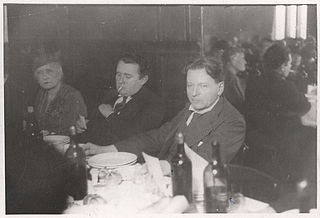Related Research Articles

Walter Hamor Piston, Jr., was an American composer of classical music, music theorist, and professor of music at Harvard University.
Martin Boykan was an American composer known for his chamber music as well as music for larger ensembles.
Symphony No. 2 by Walter Piston is a symphony composed in 1943.
The Symphony No. 6 by Walter Piston was completed in 1955.
The Symphony No. 5 by Walter Piston was composed in 1954.
The Symphony No. 8 by Walter Piston is a symphony dating from 1965.
The Sonatina for Violin and Harpsichord is a three-movement, neoclassical chamber work composed by Walter Piston in 1945, that marks the beginning of his postwar style.
Walter Piston's Fantasia for Violin and Orchestra was commissioned in 1970 by Mario di Bonaventura, music director of the Hopkins Center Congregation of the Arts at Dartmouth College, who conducted the world premiere on March 11, 1973, performed by the Dartmouth Symphony Orchestra with Salvatore Accardo as the soloist. The commission had been made specifically for Accardo.
String Quartet No. 1 by Walter Piston is a chamber-music work composed in 1933.
String Quartet No. 2 by Walter Piston is a chamber-music work composed in 1935.
String Quartet No. 4 by Walter Piston is a chamber-music work composed in 1951.
String Quartet No. 5 by Walter Piston is a chamber-music work composed in 1962.

Música de feria is a composition for string quartet by the Mexican composer and violinist Silvestre Revueltas, written in 1932. Though not so titled by the composer, it is sometimes referred to as his String Quartet No. 4. A performance lasts a little more than nine minutes.

String Quartet No. 1 by the Mexican composer and violinist Silvestre Revueltas was composed in 1930.

String Quartet No. 3 is a chamber-music work written in 1931 by the Mexican composer and violinist Silvestre Revueltas.

String Quartet No. 17 is the last of seventeen quartets by the Brazilian composer Heitor Villa-Lobos, and was written in 1957. A performance lasts approximately twenty minutes.

Piano Quartet No. 2 in D minor, Op. 30, is a chamber-music composition by the Romanian composer George Enescu, written in 1943–44.

The String Quartet No. 2 in G major, Op. 22, No. 2, is a chamber music work by the Romanian composer George Enescu, composed mainly between 1950 and 1951, though it has a lengthy pre-history and received a number of revisions in 1952 and possibly early 1953. The score is dedicated to the American pianist, composer, and arts patron, Elizabeth Sprague Coolidge. A performance of it lasts about 25 minutes.

The String Quartet No. 1 in E-flat major, Op. 22, No. 1, is a chamber music work by the Romanian violinist and composer George Enescu, composed between 1916 and 1920. A performance of it lasts about 45 minutes.
References
- ↑ Pollack 1982, 102.
- ↑ Pollack 1982, 102–103.
- ↑ DeVoto 1988.
Sources
- DeVoto, Mark. 1988. Booklet notes for Walter Piston: String Quartet No. 1; String Quartet No. 2; String Quartet No. 3. The Portland String Quartet (Stephen Kecskemethy and Ronald Lanz, violins; Julia Adams, viola; Paul Ross, cello). CD recording. Northeastern NR 9001 CD. Boston: Northeastern University.
- Pollack, Howard. 1982. Walter Piston. Studies in Musicology. Ann Arbor: UMI Research Press. ISBN 0-8357-1280-X.